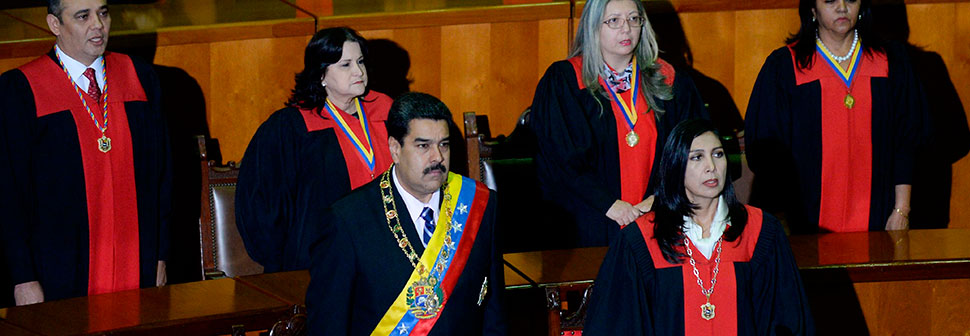US sanctions 8 judges on Venezuela’s Suprem Court


The U.S. imposed a new round of sanctions on high-level Venezuelan officials, this time targeting eight Supreme Court judges that Washington accused of damaging their nation’s democracy by steadily stripping the opposition-controlled congress of any authority.
The executive order issued Thursday marked the second time the U.S. has sanctioned leaders of Venezuela’s socialist government since Donald Trump became president this year. In February, the U.S. announced it was freezing the assets of Vice President Tareck El Aissami, accusing him of playing a major role in international drug trafficking.
Those blacklisted under the latest decree include Maikel Moreno, the president of the government-packed Supreme Court, as well as all seven justices who signed a ruling in late March nullifying congress. The ruling was later partially reversed amid a surge of international criticism, but it sparked a protest movement that has seen almost daily street demonstrations for nearly two months – sometimes violent unrest that recorded its 45th death Thursday.
“By imposing these targeted sanctions, the United States is supporting the Venezuelan people in their efforts to protect and advance democratic governance in their country,” U.S. Treasury Secretary Steven T. Mnuchin said.
Venezuelan Foreign Minister Delcy Rodriguez decried the U.S. sanctions on Twitter as “outrageous and unacceptable.” She said the order was one more example of U.S. attempts to destabilize Venezuela’s government, adding that Maduro strongly backs the Supreme Court magistrates who are “victims of U.S. imperial power.”
Trump’s administration has repeatedly raised concerns that Maduro is moving toward one-party, authoritarian rule. Earlier Thursday, the U.S. leader expressed dismay about Venezuela’s troubles, asking aloud how a nation holding the world’s largest oil reserves could be stricken by so much poverty and turmoil.
“You sort of have to wonder: Why is that happening? How is that possible? Hopefully that will change and they can use those assets for the good. Because right now what’s happening is really a disgrace to humanity,” Trump said after meeting at the White House with Colombian President Juan Manuel Santos.
In issuing its sanctions ruling, the U.S. Treasury Department cited several court rulings since the opposition gained control of congress in 2016. One was the approval of Maduro’s budget and his appointment of two government sympathizers to the National Electoral Council, decisions that are supposed to require National Assembly approval. Another was a ruling a year ago declaring null all acts of the National Assembly issued while it remains in contempt of an earlier ruling requiring the congress to unseat three elected lawmakers over still-unproven allegations of voting fraud.
Moreno, while not directly involved in those decisions, has defended them and from the bench also upheld a nearly 14-year sentence for opposition leader Leopoldo Lopez a day after Trump called for his release at a White House meeting with Lopez’s wife.
Venezuela’s Supreme Court has long been filled with government loyalists. The court’s constitutional chamber declared null and void eight National Assembly laws between January and October 2016, after just one such ruling in the previous 200 years, legal experts say.
The new sanctions come as Maduro is facing increasing pressure at home and abroad to hold elections. On Thursday, several thousand demonstrators once again disrupted life in Caracas and other cities with protests that ended in clashes with security forces firing tear gas and rubber bullets, leaving more than 50 people injured.
In the western city of Maracaibo, a 25-year-old was killed when he was crushed by a truck during a protest, the chief prosecutor’s office said. Local media said he was a medical student belonging to the so-called “Green Cross,” a group of volunteer first-responders that is a fixture at opposition marches.
Associated Press | Joshua Goodman and Christine Armario





